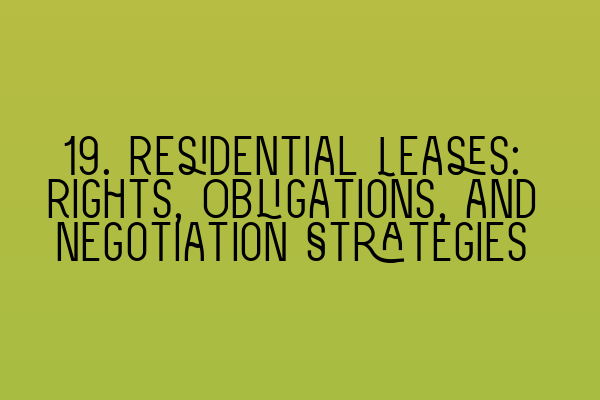19. Residential Leases: Rights, Obligations, and Negotiation Strategies
As an expert in property law, it is crucial to have a deep understanding of residential leases. Residential leases are legally binding contracts between a landlord and a tenant, outlining the rights and obligations of both parties. Whether you are a solicitor, a property owner, or a prospective tenant, understanding the intricacies of residential leases is essential. In this blog post, we will explore the key aspects of residential leases, including the rights and obligations of each party, as well as some negotiation strategies to consider.
Rights and Obligations of the Landlord
Landlords have various rights and obligations under residential leases. One of the primary rights of a landlord is the right to collect rent from the tenant. Residential leases typically outline the rent amount, frequency of payment, and any penalties for late payments. It is important for landlords to ensure that the rent amount is fair and reasonable, taking into consideration the current market value of the property.
Another important right of the landlord is the right to access the property for inspections or repairs. However, the landlord must provide proper notice to the tenant and respect their privacy. It is crucial for landlords to understand the legal requirements for property access and follow the necessary protocols to avoid any potential legal disputes.
Additionally, landlords have the obligation to maintain the property and ensure that it meets certain health and safety standards. This includes regular inspections, repairs, and addressing any issues that may arise. Failure to fulfill these obligations can lead to legal consequences, including potential liability for injuries or damages caused by negligence.
Rights and Obligations of the Tenant
Tenants also have rights and obligations under residential leases. One of the key rights of the tenant is the right to quiet enjoyment of the property. This means that the tenant has the right to peacefully and undisturbedly occupy the property without interference from the landlord. If the landlord violates this right, the tenant may have grounds for legal action.
Another essential right of the tenant is the right to have the property in a habitable condition. This includes basic amenities such as water, heating, and electricity. If the property becomes uninhabitable due to the landlord’s negligence, the tenant may have the right to withhold rent or terminate the lease.
As for obligations, the tenant has the responsibility to pay rent on time and maintain the property in a reasonably clean and undamaged state. Any damages caused by the tenant beyond normal wear and tear may result in deductions from the security deposit or potential legal action.
Negotiation Strategies for Residential Leases
Negotiating the terms of a residential lease can be a delicate process. Whether you are a landlord or a tenant, it is essential to approach negotiations with a clear understanding of your rights and obligations. Here are some strategies to consider:
- Research the local rental market: Understanding the rental market in your area is crucial for negotiating a fair rent amount. Research comparable properties and their rental prices to determine the market value of the property.
- Identify key priorities: Prioritize your needs and objectives before entering into negotiations. For landlords, it may be important to secure a stable, long-term tenant. For tenants, it may be crucial to negotiate favorable lease terms and conditions.
- Seek legal advice: Consult with a property law solicitor to ensure that you understand your rights and obligations under the lease. A solicitor can also guide you through the negotiation process and help draft a legally sound lease agreement.
- Communicate openly: Effective communication is key during lease negotiations. Clearly express your expectations, concerns, and any specific requirements you may have. This will help build a mutually beneficial agreement.
- Consider compromise: In negotiations, it is often necessary to find common ground and make compromises. Flexibility can lead to a successful outcome that satisfies both parties.
By following these negotiation strategies, you can increase the likelihood of reaching a fair and mutually beneficial agreement.
Conclusion
Residential leases play a critical role in the landlord-tenant relationship. Understanding the rights and obligations of each party is essential for a smooth and harmonious tenancy. Whether you are a solicitor, a property owner, or a prospective tenant, it is important to approach residential leases with a comprehensive understanding of the legalities involved. By utilizing the negotiation strategies outlined above, you can navigate lease negotiations effectively and establish a solid foundation for a successful tenancy.
For more information on property law and preparing for SQE exams or obtaining SRA accreditation, be sure to check out our related articles:
